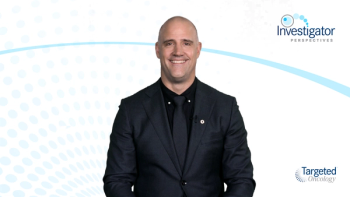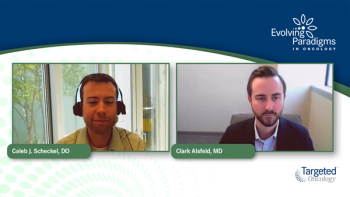
Current and Future Challenges in the Treatment of CLL
Andrew Zelenetz, MD, reflects on the impact of moving agents to the frontline for treatment of chronic lymphocytic leukemia and how that impacts treatment decisions in relapsed/refractory chronic lymphocytic leukemia.
Episodes in this series

Andrew Zelenetz, MD: We know that the whole field of CLL [chronic lymphocytic leukemia] is changing. As we start to move more of these agents into the frontline and we use combinations of venetoclax and BTK [Bruton tyrosine kinase] inhibitors, it will raise challenges to us for what we do in the relapse/refractory setting. That’s where we’re going to see the PI3K inhibitors emerge as an important role, even if they have their use as a bridging strategy for patients who are then going to go on to CAR [chimeric antigen receptor] T cells, which can be highly effective in relapse/refractory disease.
One thing that’s important is that CLL evolves over time. It’s very important, when your patient is progressing, that you reevaluate them. Their IGHV mutation status will never change. But their TP53-mutation status can change. Their FISH [fluorescence in situ hybridization] characteristics can also change. If they have complex carrier type, then that will definitely evolve. Knowing how high risk a patient is, is going to help you sort through the options for the patient relapse/refractory CLL.
This transcript has been edited for clarity.
Case: A 77-Year-Old Man With Chronic Lymphocytic Leukemia
Initial Presentation
- A 77-year-old man presented to urgent care reporting worsening fatigue accompanied by persistent, unexplained fevers and night sweats over the past few weeks and unintentional 12-lb weight loss over the past 6 months
- PMH: HTN, medically controlled; BPH; OA in spine and hips
- PE: palpable cervical, axillary, and right-sided inguinal lymphadenopathy
Clinical Workup
- Labs: WBC 49,000, lymphocyte 74%, ANC 3700/mm3, Hb 9.2 g/dL, PLT 90 x 109/L, LDH 240 U/L, B2M 4.1 mg/L
- FC: CD 5+, CD23+, CD20+ monoclonal B-cell population; confirmed diagnosis of CLL
Hem/Onc Workup
- Mutation testing: IGHV unmutated; FISH: positive for del(11q)
- Rai stage IV; Binet stage C
- ECOG PS 1
Treatment
- Started on treatment with ibrutinib 420 mg PO QD; his symptoms improved and he achieved partial response
- 3 months into treatment he returned to urgent care reporting SOB, pain in his chest, confusion, and anxiety; he was convinced he was having a heart attack
- Work-up revealed treatment-related atrial fibrillation
- Situation was explained to the patient and he was offered medication and monitoring but preferred to change to a different medication out of concern for this happening again or worsening
- Labs were repeated
- Treatment was initiated with idelalisib 150 mg PO BID + rituximab








































